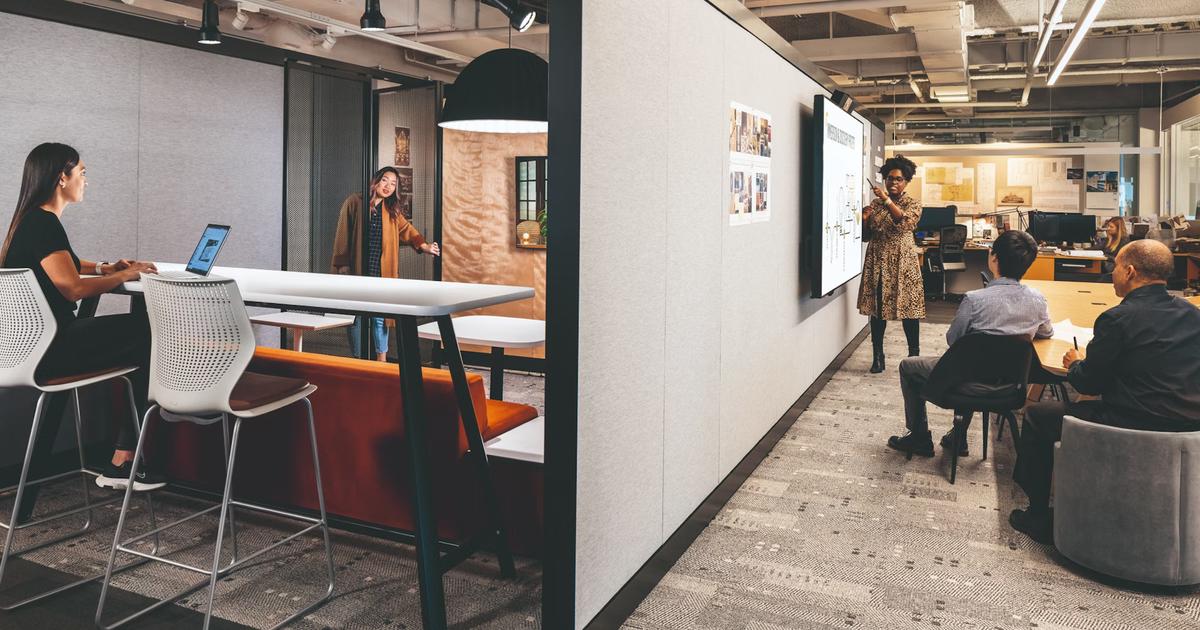Between the head office teams, management positions and operational staff in the field, three sectors illustrate the difficulties that managers and human resources (HR) managers have been facing over the past year.
It is indeed difficult to combine construction and teleworking.
In this sector which employs nearly 1.5 million people, Olivier Salleron, president of the French Building Federation (FFB) estimates “between 15% and 20% maximum all those who could telework”.
In other words, more than 80% of employees are face-to-face.
On site or in production workshops, nothing is possible remotely, including supervision.
Stopped during the first confinement, the sector massively resorted to partial unemployment, but almost no one has been affected since the reopening of the sites.
Another sector whose reality of activity lends itself little to directives to give priority to teleworking: the automobile.
Despite the fall in vehicle purchases, down 23.7% in Europe, according to the European Association of Manufacturers, sellers go to dealerships every morning.
Likewise, workers continue to go to the factory despite a 21% drop in European production.
Only large groups can set up teleworking in tertiary professions: 18,000 employees out of 51,000 at PSA, for example.
Finally, for mass distribution and its 750,000 employees, on-site work is essential in stores and on logistics platforms.
Some brands have resorted to partial unemployment for only a day or two, in November 2020. Today, only the employees of the headquarters are, in part, teleworking.
At Lidl, the HRD obtains 50% of teleworking in Strasbourg (Bas-Rhin) because many tasks do not allow this configuration.
On the Rungis site (Val-de-Marne), there is less face-to-face (70% teleworking), with rotations so that everyone does not come on the same days.
Construction executives: keep the link with the site
Like all business leaders, Frédéric Carré, at the head of a metalwork and aluminum joinery company near Toulouse (Haute-Garonne), must ensure the safety of his employees in the face of the pandemic.
In its activity, construction sites and production require face-to-face work.
Of its 200 employees, a third is in workshops, a third on construction sites and a third in offices.
And this, since the end of the first confinement, when all the sites, stopped for a month and a half, were able to resume.
“At the beginning, we didn't know how to do it,” recalls Frédéric Carré, also president of the French Building Federation (FFB) Occitanie.
"It was the cacophony", he concedes, both for the implementation of teleworking overnight, for its employees able to be, and for the resumption on sites.
Morning essentials newsletter
A tour of the news to start the day
Subscribe to the newsletterAll newsletters
READ ALSO>
The galley of construction workers deprived of restaurants
In the field, the release of the guide from the Professional Organization for the Prevention of Building and Public Works (OPPBTP) made it possible to organize things: smooth out schedules, provide remote workspaces, establish a sense of movement, put gel and masks available… Not without apprehension.
“The men returned in a climate of anxiety.
It was necessary to explain to them that they could rework, that the safety rules existed… In spite of everything, some did not feel it, 15% were then on short-time working, ”he recalls.
Since then, all the sites have been opened and Frédéric Carré's teams on the bridge, “in good conditions”.
"We have security quarters of an hour to explain to us the respect of sanitary rules", specifies Yann Ghisleni, metal locksmith.
“In the workshop, we are all in the same boat,” he says.
His superiors?
“They do as they want but, he admits, it's a little better that they are there too.
"
For those who can a priori work from home - work supervisors, project managers, coordinators - the rule is more flexible.
After having started to divide their time between telework and face-to-face, organized site meetings by videoconference with tablets, all are now coming back to their teams as closely as possible.
“They don't want teleworking,” says Frédéric Carré.
The sector also recommends that supervisors stay in direct contact with the sites "for reasons of safety and maintaining links", specifies Olivier Salleron.
For reasons of equity too, recognizes the president of the French Building Federation (FFB).
“A site is a team,” he explains.
If the boss is not at his post and lets his guys work there 35 hours a week, it can lead to psychological problems.
"
Despite this grassroots culture at almost all levels, Frédéric Carré says despite everything looking with the unions "how to set up teleworking one day a week", when possible.
As long as you have the same conditions at home as in the office.
Which, on the equipment side, poses some problems.
“We are trying to digitize, but that is not customary,” he emphasizes.
The building world is slowly entering the digital revolution ”.
However, tempers Olivier Salleron, “impossible to use the 3D BIM software
(Editor's note: creation of models for the building trades)
with his small laptop.
You need powerful machines, connect to the company's server and have a very high speed.
"
Partial unemployment among auto mechanics and engineers
At PSA, 18,000 of the company's 51,000 employees in France are experimenting with remote work, while at Renault, they are around 20,000 out of 32,000 employees in France.
The diamond brand has increased short-time working, primarily in engineering and the tertiary sector, since the end of February.
Around 13,000 group employees in the Paris region have switched to a four-day week.
Their salary remains unchanged since an agreement signed with the majority of unions allowed the creation of a solidarity fund.
In return, each employee gives one day of leave or RTT for five days of non-activity.
Production is not affected by this measure, but many auto workers also find themselves on short-time work due to the global semiconductor shortage.
If the large groups manage to impose teleworking on all the tertiary sector (design, marketing, communication), it remains impossible for the workers in the production lines, as for the salesmen and mechanics of the concessions.
“We can't bring a car's engine back to our living room for repair,” jokes Joao Pedro.
The question of teleworking does not arise for this director of a Renault agency, in Vanves (Hauts-de-Seine), with twelve employees.
Vanves (Hauts-de-Seine), March 25.
In car dealerships, managers must establish schedules by combining partial unemployment and work on site.
LP / Philippe Lavieille Ph Lavieille
He is obliged to impose days of partial unemployment according to demand.
A headache for this boss who tries to equalize the number of working days for each employee.
“For the mechanics, it sometimes happens to me to organize their schedule from day to day.
It's easier for secretaries, who rotate from week to week.
"
Joao Pedro estimates that the number of appointments has dropped by around 30% per week.
“Fortunately, we continue to be entrusted with a lot of company vehicles.
They always continue their activity, whether it is the media, delivery companies or paramedics.
This is the advantage of also being in large cities, ”he says.
As for the salesperson of the agency, if his presence can be daily, his salary is affected by the drop in sales on which he normally receives a commission.
The situation is worse in large dealerships, where new cars are starting to collect dust.
At Leclerc, accountants help department employees
Since the start of the pandemic, supermarket cashiers have been on the front lines, serving their customers.
Unlike some competitors, there has been no partial unemployment at Lidl, where the absenteeism rate returned to its normal level as of May 2020.
Out of 40,000 employees in France in 1,500 stores and 25 logistics platforms, only the 1,000 employees at head office (650 in Rungis and 350 in Strasbourg) have “teleworking” tasks.
If, at the first confinement, almost all of these administrative staff remained at home, Anne Broches, executive director of HR Lidl France, notes that it was subsequently difficult to force them to work remotely.
“The head office staff did not want it,” she explains, “Either because of poor working conditions at home, or out of a need for social ties, or to psychologically escape the context of the pandemic.
"
READ ALSO>
"Many are at the end of the line": stress, isolation ... the great fed up of teleworking employees
The management teams maintained their rate of presence in the field at least two days a week (except during the first confinement), by limiting their presence in the office on other days thanks to videoconferences.
Logistics Director of Lidl France, at the head of sixty people based in Rungis, Hugues Pegon now performs his office days from his home in Auvergne, rather than at the Ile-de-France headquarters, which allows him to visit the platforms in the south of France, from Nice (Alpes-Maritimes) to Béziers (Hérault).
“Before the pandemic, it was planned visits, with presentations.
Since then, we travel mainly to help the teams, meet their needs, ”says the executive, emphasizing the importance of these trips.
“I meet the manager of the platform, who works with three executives for 200 operators.
These are people who are behind the scenes, as they say, they have always been present, ”he underlines again.
“We have to make sure with them that the sanitary instructions have been put in place.
It is also an opportunity to reassure the executives of their good organization - they have set up a work rate of 3/8 (three 8-hour shifts) instead of 2/8 to limit crossovers -, but also to discuss good practices and provide them with psychological support.
"
In the E.Leclerc store in Fameck (Moselle), the director, Thierry Lefeuvre, was also able to count on the mobilization of his 350 employees, including 20 administrative teleworking for two thirds.
"I have never heard the slightest reflection on the fact that some can work at home and others not," says the manager.
At the head of this store for fifteen years, he applies his recipe twice a year to ensure cohesion between administrative staff and department employees.
“During busy periods in the store, at Christmas and Easter, I bring down the accounting department to help put products on the shelves.
Because in accounting, whether the invoices are important or not, it does not change the volume of work.
But in the store, yes, ”he says.
“I've always done this, even last December.
"
The director himself is more present than ever.
“It's important to be there, we're on the same boat.
The manager must ensure that the barrier gestures are well respected, I am uncompromising on this, ”emphasizes Thierry Lefeuvre.
He regularly enjoys reminding his teams that he was the only supervisor to contract the virus in March 2020.






/cloudfront-eu-central-1.images.arcpublishing.com/prisa/F5MUQT6JFZFAZGDYBYG5BZQJIQ.jpg)


